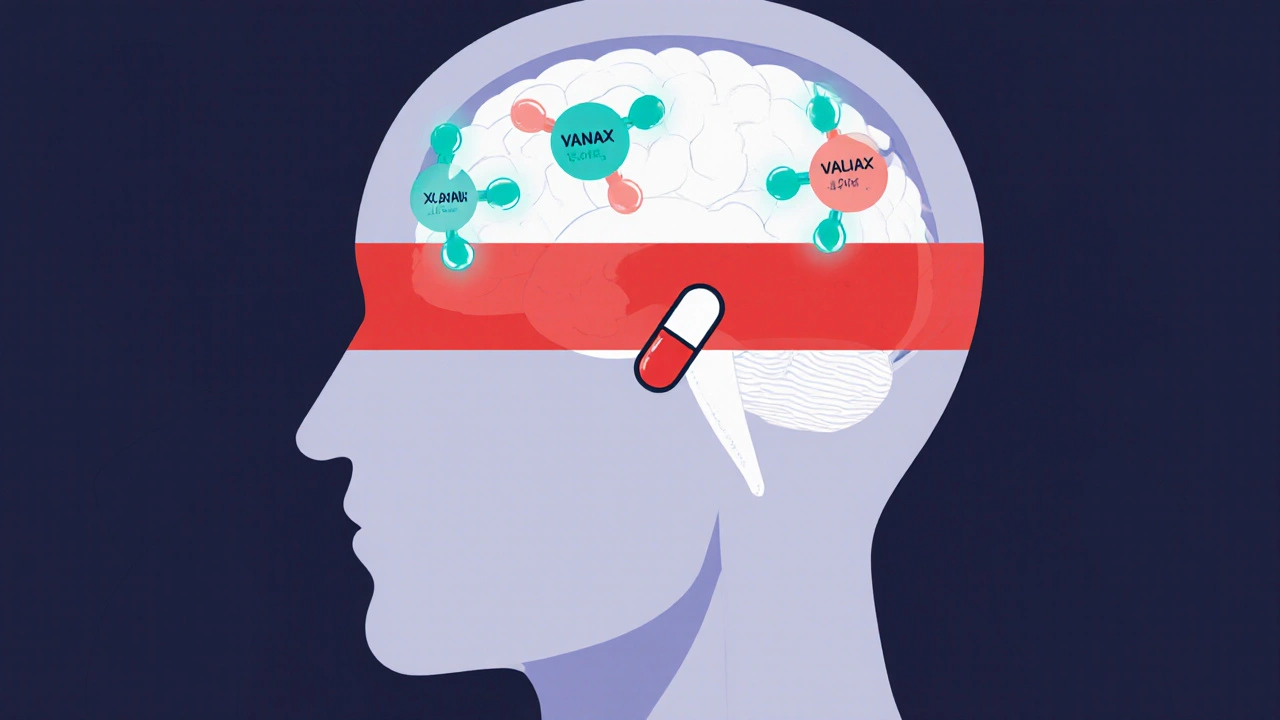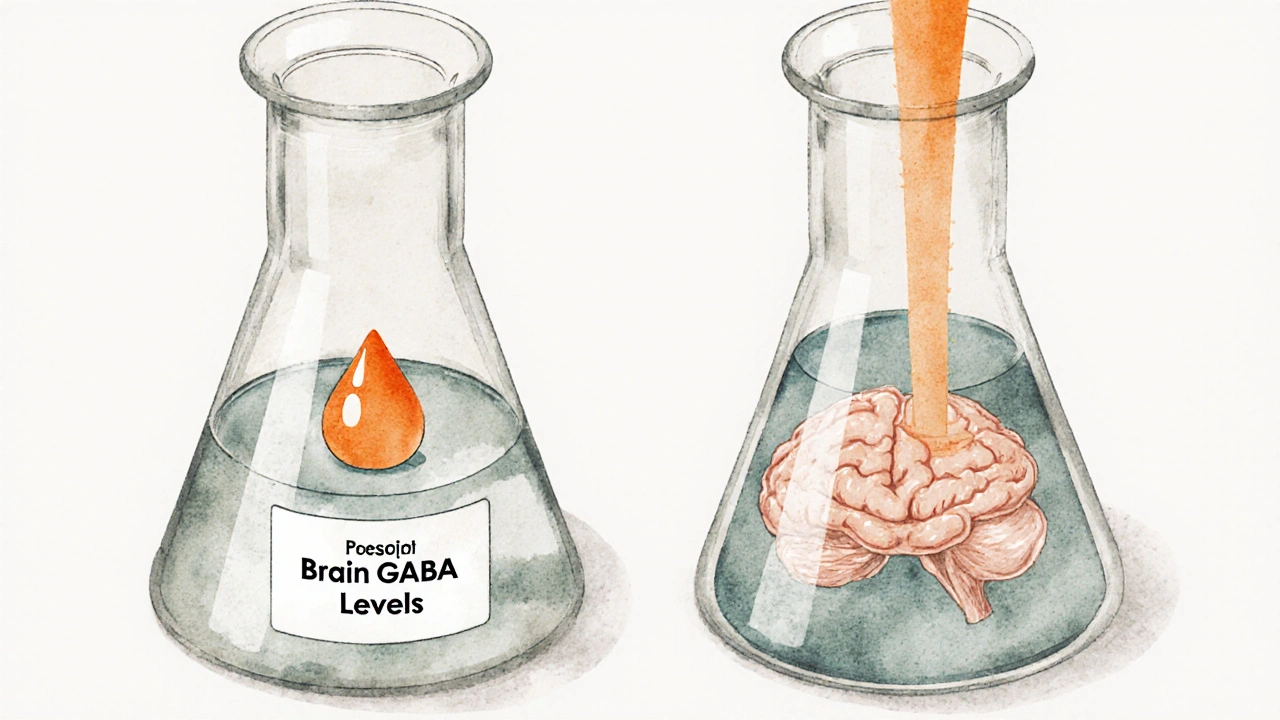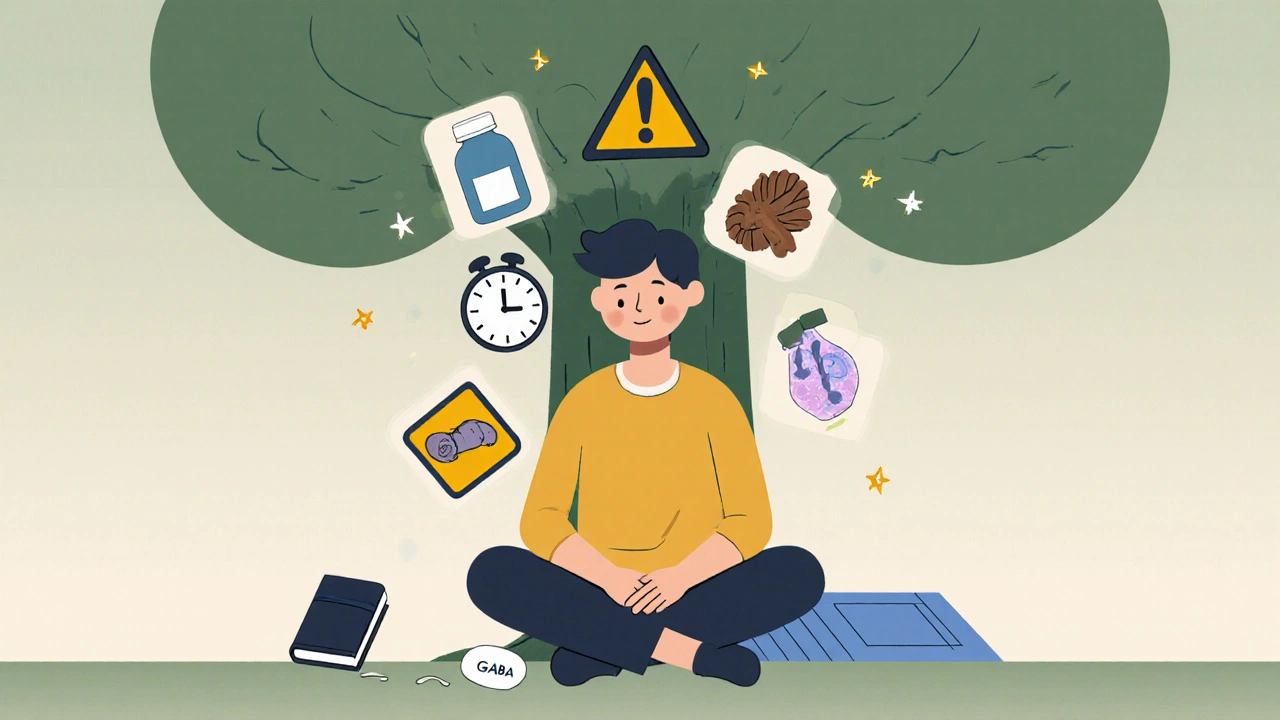
People take GABA supplements hoping to calm their minds, ease anxiety, or sleep better. But if you’re also on a prescription sedative-like Xanax, Valium, or even sleeping pills-there’s a question that keeps popping up: Can GABA supplements make sedatives too strong? The short answer? Probably not. But the reason why matters more than the answer itself.
What GABA Actually Does in Your Brain
Gamma-aminobutyric acid, or GABA, is your brain’s main calming signal. It’s a neurotransmitter that tells nerve cells to slow down. When GABA binds to receptors in your brain, it opens channels that let chloride ions in. This makes neurons less likely to fire, which reduces anxiety, muscle tension, and overactive thinking. That’s why drugs like benzodiazepines work-they boost GABA’s effect, making you feel relaxed, drowsy, or even numb to pain. But here’s the catch: GABA supplements you buy at the store aren’t the same as the GABA your brain makes. The GABA in pills is made in a lab and swallowed like a vitamin. And when it hits your stomach, it doesn’t go where you think it does.Why Oral GABA Doesn’t Reach Your Brain
Your brain is protected by the blood-brain barrier-a smart, selective filter that keeps out things that shouldn’t get in. GABA is too water-soluble and too big to slip through easily. Studies show less than 0.03% of the GABA you take orally ever reaches your brain. A 2012 study with 42 people found no increase in GABA levels in their spinal fluid after taking 750 mg doses. That’s like pouring a bucket of water into the ocean and expecting the tide to rise. Prescription sedatives, on the other hand, are designed to cross that barrier. Diazepam (Valium) hits your brain within 30 minutes. Alprazolam (Xanax) does the same. They bind directly to GABA receptors and make them more responsive. GABA supplements? They just sit in your bloodstream. Their peak concentration is around 1.5-3.0 μg/mL. Your brain naturally holds GABA at 1,000-2,000 μg per gram of tissue. The difference isn’t small-it’s millions of times too low to matter.So Why Do People Worry About Additive CNS Depression?
CNS depression means your central nervous system slows down too much. Signs include extreme drowsiness, slow breathing (under 8 breaths per minute), low blood pressure, confusion, or worse-coma or death. This is a real danger when you mix alcohol with benzodiazepines, or opioids with sleeping pills. The FDA has black box warnings for those combinations. The fear around GABA supplements comes from logic, not evidence. If GABA calms the brain, and sedatives boost GABA, then more GABA should mean more calming, right? But biology doesn’t work that way. You can’t pour more water into a glass that’s already full. Your GABA receptors are already being fully activated by the prescription drug. Adding a tiny, ineffective dose of oral GABA doesn’t turn up the volume-it’s like turning on a flashlight next to a spotlight.
What the Science Actually Shows
A 2018 meta-analysis of 17 studies involving over 1,200 people found no difference in sedation levels between those who took GABA supplements and those who took a placebo-when both groups were also on standard doses of benzodiazepines. The Stanford Sleepiness Scale, Epworth Sleepiness Scale, and Visual Analog Scale all showed no meaningful change. The FDA’s adverse event database (FAERS) from 2010 to 2022 recorded only three possible cases of GABA supplement interactions with sedatives. None met the minimum threshold for being labeled as a confirmed adverse reaction. Compare that to over 12,800 cases of dangerous interactions between opioids and benzodiazepines in the same time period. Even Amazon reviews tell the story: out of more than 2,500 reviews of top-selling GABA supplements, 78% of negative reviews said “I didn’t feel anything.” Not “I felt too sleepy.” Not “I almost passed out.” Just-nothing.What About Other Supplements That Affect GABA?
Here’s where things get real. GABA supplements aren’t the problem. Other supplements are. Valerian root? It makes your brain release more GABA. Kava? It stops your brain from reabsorbing GABA. Phenibut? It’s a synthetic compound that crosses the blood-brain barrier and acts like GABA directly. These aren’t theoretical risks. A 2020 review found kava increased sedation by 37% when taken with zolpidem (Ambien). Valerian has been linked to dangerous drowsiness with alcohol and benzodiazepines. The European Medicines Agency and FDA both say: GABA supplements? Low risk. But valerian, kava, phenibut? High caution. The National Institute on Drug Abuse reports that 41% of emergency visits involving supplement-sedative combos involved these other substances-not GABA itself.
What Should You Do?
If you’re on a sedative and thinking about trying GABA supplements:- Don’t panic. The science says it’s extremely unlikely to cause additive depression.
- Don’t assume it works. Most people feel nothing. It’s not a magic calm pill.
- Do talk to your doctor. Even if the risk is low, your doctor needs to know everything you’re taking.
- Avoid alcohol. Alcohol + sedatives is a known danger zone. Adding GABA won’t make it worse-but alcohol will.
- Watch for drowsiness. If you feel unusually sleepy, dizzy, or foggy, stop the supplement. It’s not GABA-it could be something else.
- Be careful with other supplements. Valerian, kava, melatonin, and phenibut? These are the real risks.
The Future of GABA Supplements
Scientists know GABA doesn’t work as a pill. So they’re trying to fix it. A 2023 clinical trial is testing a modified version called GABA-C12-a molecule attached to a fatty acid so it can slip past the blood-brain barrier. Early animal studies show 12.7 times more brain uptake. If this works in humans, everything changes. That version could actually interact with sedatives. But it’s not on the market yet. And it’s not what you’re buying now. Right now, the GABA supplements on shelves are just expensive placebo pills with no real brain impact. They won’t make your Xanax stronger. But they won’t make you feel better either.Bottom Line
GABA supplements don’t cause additive CNS depression with sedatives-not because they’re safe, but because they don’t do anything in the brain. The fear is based on a misunderstanding of how GABA works. The real danger isn’t the supplement. It’s assuming it works, ignoring other substances that actually do, and skipping the conversation with your doctor. If you want to feel calmer while on sedatives, focus on what actually helps: sleep hygiene, stress reduction, therapy, and avoiding alcohol. Skip the GABA pill. Save your money. Your brain doesn’t need it.Can GABA supplements make my benzodiazepine too strong?
No. Oral GABA supplements do not cross the blood-brain barrier in meaningful amounts, so they cannot enhance the effects of benzodiazepines or other sedatives. Studies show no increase in sedation, drowsiness, or respiratory depression when GABA supplements are taken with prescription CNS depressants.
Is it safe to take GABA with alcohol and Xanax?
It’s not recommended. While GABA itself won’t make the combination more dangerous, alcohol and Xanax together significantly increase the risk of severe CNS depression, including slowed breathing and loss of consciousness. Adding GABA supplements won’t worsen this, but alcohol will. Avoid mixing alcohol with any sedative, regardless of supplements.
Why do some people say GABA made them sleepier?
Some people report feeling slightly drowsy, but this is likely due to the placebo effect, the timing of the dose (e.g., taking it at night), or other ingredients in the supplement (like magnesium or L-theanine). Clinical studies show no measurable increase in sedation compared to placebo. GABA itself doesn’t cause this effect.
Are there any supplements that *do* interact with sedatives?
Yes. Valerian root, kava, phenibut, and even high-dose melatonin can enhance sedative effects because they directly influence GABA signaling in the brain. These carry real interaction risks and have been linked to dangerous drowsiness or respiratory depression when combined with benzodiazepines or sleeping pills.
Should I stop taking GABA if I’m on a sedative?
You don’t need to stop for safety reasons, but you should stop for effectiveness reasons. GABA supplements don’t work as advertised. If you’re taking them hoping to reduce anxiety or improve sleep, you’re better off investing in proven methods like cognitive behavioral therapy, better sleep habits, or talking to your doctor about adjusting your medication. There’s no benefit and no risk-but also no reward.

Amy Hutchinson
November 26, 2025 AT 06:08I took GABA for three weeks because my therapist said it might help with my anxiety
Didn’t feel a thing
But I did feel like I wasted $25 and my dignity
Now I just drink chamomile tea and pretend I’m a zen monk
Archana Jha
November 27, 2025 AT 10:30ok but what if the blood brain barrier is just a lie made by big pharma to sell you xanax?
what if gaba does get in but they dont want you to know because then people would stop buying pills?
and what if the 0.03% is enough to stack with benzos and they just dont test for it because its too expensive?
also i read on a forum that gaba can cross if you take it with fenfluramine which is banned in the us but available in thailand
theyre hiding the truth
trust no one
Aki Jones
November 29, 2025 AT 04:36Let’s be clear: The FDA’s FAERS database is a joke. It’s self-reported, underpowered, and biased toward acute events. Three cases? That’s not evidence-it’s noise.
Meanwhile, the 2018 meta-analysis? Flawed. Most studies used suboptimal dosing, short durations, and didn’t control for gut microbiome variability-which modulates GABA absorption.
And don’t get me started on Amazon reviews. People who say ‘I didn’t feel anything’ are either placebo-resistant or lying to feel better about their purchase.
This isn’t science. It’s corporate sanitization of pharmacology.
And yes-I’ve seen patients on benzos who started GABA and developed ataxia. It wasn’t in the records. But I saw it.
Trust your clinical eyes, not your PubMed search.
Jefriady Dahri
November 29, 2025 AT 15:16Hey everyone, I just want to say this post was super helpful 😊
As someone who’s been on zolpidem for years, I was terrified to try anything else
But now I know GABA supplements are basically useless-and that’s actually a relief!
Turns out, my real problem was scrolling TikTok at 2 a.m.
Now I read physical books before bed and drink warm milk
Life’s better without fake science pills 💪
Also, if you’re struggling, DM me-I’m always here to chat!
Sharley Agarwal
December 1, 2025 AT 01:21Pathetic.
You spent 2000 words to say ‘it doesn’t work’.
And you still didn’t tell people what to do instead.
Lazy.
Shivam Goel
December 1, 2025 AT 06:46Sharley’s comment is valid-this article is a masterclass in over-explaining the obvious.
But let’s not miss the real issue: the supplement industry thrives on placebo-driven hope.
People don’t buy GABA because they believe in neuroscience-they buy it because they’re desperate.
And that’s not a pharmacological problem-it’s a societal one.
Why are we so afraid of stillness?
Why do we need a pill to quiet our minds?
Maybe the real CNS depressant isn’t Xanax-it’s capitalism.
Leisha Haynes
December 1, 2025 AT 16:35So you're telling me I spent $30 a month for 8 months on something that's just glorified salt water?
Wow
My therapist is gonna love this
Also I just realized I've been taking it with magnesium and L-theanine
So technically I was just taking a fancy vitamin cocktail
And I thought I was biohacking my way to enlightenment
Thanks for the reality check, I guess 😅
Kimberley Chronicle
December 2, 2025 AT 18:05Really appreciate the breakdown on valerian and kava-those are the real culprits.
My cousin ended up in ER after mixing kava with lorazepam-no one warned her.
Also, the GABA-C12 trial sounds fascinating-if it works, we might finally have a real GABA therapy.
Until then, I’m sticking with CBT and sleep restriction.
Also, anyone else feel like we’ve been sold a river of snake oil disguised as ‘natural wellness’?
It’s exhausting.
Shirou Spade
December 2, 2025 AT 18:40It’s not that GABA doesn’t work-it’s that we’ve misunderstood what ‘working’ means.
We treat the brain like a machine you can tweak with chemicals.
But the mind isn’t a circuit board.
It’s a living ecosystem.
Supplements are band-aids on a wound that needs rest, silence, and time.
The real sedative isn’t Xanax.
It’s the noise we refuse to turn off.
Maybe the supplement industry isn’t lying.
It’s just selling us the wrong solution.
And we keep buying it.
Because quiet is scary.